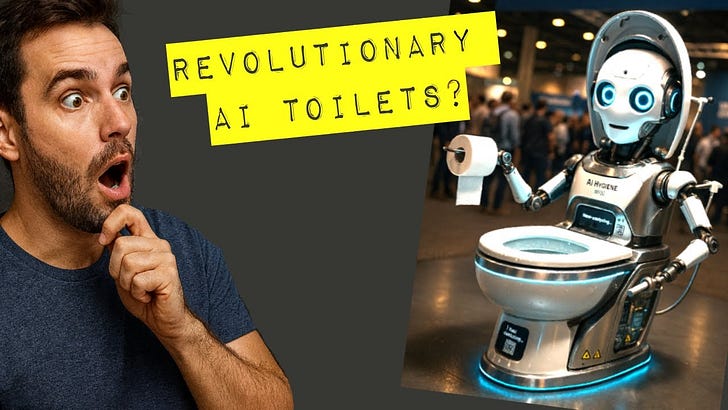Here’s an uncomfortable question for your next board meeting:
When the guy who engineered viral content that’s been viewed more times than the global population admits he’s scared of where AI is taking us—while simultaneously using it every day—what does that tell you about the inflection point we’re actually facing?
Last week I sat down with Taylor, Mr. Beast’s former lead editor, and Renzo, an entrepreneur who’s built multiple successful ventures. What started as a casual conversation about AI and storytelling turned into something else entirely: a three-way dissection of how we’re all racing toward a hyperreality that might make us fundamentally dumber, more isolated, and weirdly enough, more dependent on technology to do our thinking.
The irony? We recorded this entire conversation digitally, will promote it on social platforms, and I’m using AI right now to help position it for maximum engagement.
Welcome to the paradox we’re all living in.
Watch full video here:
The Netflix Problem Nobody’s Talking About
Taylor dropped something early that should make every content strategist’s blood run cold:
“I think fast editing and hyper-colorful graphics are almost like a poor man’s version of good storytelling.”
This from someone who helped create some of the most successful retention-optimized content on the planet.
Think about that. The techniques that dominate YouTube, TikTok, and increasingly corporate communications—the rapid cuts, the stimulus overload, the 72-beats-per-minute kick drum designed to hijack your attention—he’s calling them cheap tricks.
The real craft? Storytelling that holds attention without manipulation.
But here’s where it gets interesting: Those cheap tricks are infinitely easier to scale with AI than genuine narrative mastery. Which means we’re about to see an explosion of content that’s technically optimized for engagement but fundamentally empty of the human elements that create lasting value.
Your competitors are probably already deploying it. The question is whether you understand what you’re actually competing against.
The ChatGPT Moment That Changed Everything
JF shared a story that perfectly captures where we are:
His father-in-law fell down the stairs. Couldn’t move his leg. In the past, JF would’ve spent two hours Googling symptoms, clicking through SEO-optimized medical blogs written by AI anyway, trying to piece together whether this was serious.
This time? He described the symptoms to ChatGPT. Got a diagnosis in five seconds. Called the ambulance. Next morning, the doctors confirmed the AI was right.
“Why the fuck do I need doctors anymore?” he asked.
Before you dismiss this as hyperbole, sit with the implications:
An executive with 110+ companies under his belt just replaced years of medical training with a consumer AI tool. It worked. And now he’s conditioned to trust it over traditional expertise.
Multiply that moment across every knowledge domain. Every decision-making process. Every skill we used to develop through practice.
The Amish aren’t starting to look wise because they rejected modernity. They’re starting to look wise because they understood something about human cognitive capacity that we’re discovering the hard way: unlimited access to intelligence isn’t the same as being intelligent.
The Algorithm Is Making Us Dumber (And We Have Proof)
Here’s where the conversation turned genuinely alarming:
Recent research shows teenagers who’ve integrated ChatGPT into their daily workflow score 60-70% worse on logical thinking tests when the AI is removed.
Not 10% worse. Not 20% worse.
Sixty. To. Seventy. Percent.
We’re not talking about calculator dependency where you can’t do long division anymore. We’re talking about losing the ability to think through problems systematically. The cognitive scaffolding that took humanity millennia to develop is being outsourced in a single generation.
Henry Kissinger and Eric Schmidt wrote about this in “The Age of AI”—cognitive diminishment via reliance on artificial intelligence. Taylor referenced it. I’ve lived it watching how my own problem-solving has shifted since GPT became my co-pilot.
The neuroplasticity of our brains means we’re literally rewiring ourselves to offload thinking to AI. And unlike physical tools that extended our capabilities while keeping our core competencies intact, AI is replacing the cognitive functions themselves.
Your strategy team using AI for analysis? They’re not becoming more efficient. They’re becoming less capable of analysis without it.
The Content Singularity Nobody Saw Coming
The most fascinating part of our conversation wasn’t about what AI can do now. It was about what happens when AI-generated content becomes indistinguishable from human-created content—and personally optimized for each consumer.
Taylor laid out the trajectory: “When that kind of telemetry and data becomes the foundation of certain things, we really are maximizing and optimizing. Our brains won’t be able to downregulate stimulus anymore.”
Translation: We’re approaching a world where content is so hyper-optimized to your specific psychological triggers that you won’t be able to resist consuming it. Not because you lack willpower. Because it’s engineered at a neurological level to be irresistible.
Already happening in music. An AI band just hit #1 on Spotify. Completely artificial. Completely optimized for algorithmic success. And people love it—until they find out it’s not “real.”
But here’s the thing: In 18 months, they won’t care that it’s AI. In 36 months, they’ll prefer it because it’s better at giving them exactly what their brain craves.
The fake music channel “Fate Music” is already doing this—taking famous songs and reimagining them in completely different genres using AI. Metallica as jazz. 50 Cent as a country ballad. And it works. People actually enjoy it.
Your brand strategy isn’t competing with other brands anymore. It’s competing with infinite variations of content perfectly engineered to individual taste profiles.
The Radicalization Engine Running in Reverse
We spent considerable time on something most executives are missing: AI isn’t just changing how content is created. It’s changing how humans think by creating perfect echo chambers at scale.
Renzo nailed it: “With all the hyper-personalization, we’re each becoming lost in the bubble that’s been created by AI according to our taste, according to our needs, to basically over-consume us.”
He deliberately buys magazines from the opposite political spectrum once a month. Not because he agrees with them. Because he understands that without intentional exposure to different thinking, you become intellectually brittle.
But here’s what’s coming: AI agents that anticipate your needs before you articulate them. Imagine waking up to a personalized news feed, entertainment queue, and even conversational prompts—all optimized based on your history, your biometric data, your past preferences.
Sounds convenient, right?
Except you’ve just removed the friction that causes growth. The boredom that sparks creativity. The disagreement that sharpens thinking. The struggle that builds cognitive muscle.
Taylor put it perfectly: “If you’re just waking up and your needs are being anticipated by AI, you’re actually removing philosophically that area from your life where growth happens and change happens.”
The 90% Problem
Here’s a stat that should terrify anyone responsible for digital strategy:
Recent estimates suggest 90% of internet content created in the last three years is AI-generated. More content has been created by AI in three years than humans created in thirty years online.
This isn’t a future problem. This is happening now.
And it’s making Google almost unusable. Search for anything beyond basic facts and you get AI-written blogs regurgitating other AI-written blogs in an infinite loop of increasingly degraded information.
That’s why Renzo stopped using Google nine months ago. Why rely on an algorithm that surfaces AI slop when you can just ask the AI directly?
But here’s the meta-problem: When 90% of training data becomes AI-generated content, what happens to the next generation of AI models? They’re training on their own outputs. The digital equivalent of intellectual inbreeding.
The information ecosystem isn’t just polluted. It’s fundamentally breaking down.
So What Do We Actually Do?
This is where the conversation turned weirdly optimistic despite all the dystopian warnings.
Taylor’s approach: Extreme intentionality. He doesn’t use Instagram, TikTok, or most social platforms. When he uses YouTube (his professional platform), he maintains a written list of specific things to watch. No browsing. No algorithm surfing. Maximum friction between impulse and consumption.
Renzo’s practice: Unplugs after 5 PM every day. Leaves phone in office. Spends an hour cooking dinner with family. Consumes only Substack for social content because it requires active reading rather than passive scrolling.
My framework: Use AI extensively for execution, never for ideation. Let it handle the boring parts—structure, editing, optimization. But the creative spark, the contrarian angle, the insight that makes content valuable? That stays human.
None of us are Luddites. We’re all deep in technology, building with AI, leveraging it for competitive advantage.
But we’re also increasingly convinced that the winners in the next decade won’t be those who adopt AI fastest. They’ll be those who understand which human capabilities to protect fiercely while letting AI handle everything else.
The Uncomfortable Truth About Content Strategy
Here’s what we all agreed on: The content landscape is about to fundamentally invert.
For 15 years, the winners were those who could produce more content, faster, optimized better for algorithms. Scale was everything.
That game is over. AI will flood every platform with infinite perfectly-optimized content. The marginal value of another blog post, another video, another LinkedIn thought leadership piece approaches zero.
What has value?
The genuinely human. The provably real. The demonstrably experienced.
This conversation—three people with actual track records, discussing real implementation challenges, sharing genuine uncertainty about where this is heading—that’s becoming valuable precisely because it’s rare.
Your brand’s content strategy probably needs to make a choice: Go full AI and compete on volume and optimization, or go deliberately human and compete on authenticity and genuine expertise.
The middle ground—humans trying to sound like optimized content—that’s where most brands are right now. And it’s the worst possible position because you’re neither efficient enough to win on scale nor authentic enough to win on humanity.
Why This Conversation Matters (Even If You Never Listen)
I know what you’re thinking: “Another podcast episode about AI and content? We’ve been in meetings about this for two years.”
Yeah. And how many of those meetings included someone who’s engineered 7 billion views admitting that the techniques that got him there are becoming obsolete?
How many included someone who’s built 110+ companies explaining why he thinks the Amish might have figured something out about human cognition that Silicon Valley is discovering the hard way?
How many ended with everyone agreeing that we might be sleepwalking into a hyperreality that makes us fundamentally less capable of thinking, creating, and connecting—while simultaneously using the tools that are causing the problem?
This isn’t another hot take from consultants who’ve never built anything. This is practitioners—people actually in the arena—working through the implications in real-time.
And the conclusion we reached? There’s no going back. But there might be a way forward that doesn’t involve turning into the people in Wall-E, passively consuming personalized content fed to us by algorithms while our cognitive abilities atrophy.
The window to figure this out is narrowing. Your competitors aren’t waiting for perfect clarity. They’re making bets right now about which capabilities to augment with AI and which to protect as core human competencies.
The question isn’t whether AI changes everything. It’s whether you understand what’s actually changing.
JF.
P.S. - Taylor mentioned he can’t watch movies anymore. Renzo collects mushrooms guided by ChatGPT. I’m writing this while Claude helps me structure it. We’re all compromised. The question is whether we’re conscious of the trade-offs.













